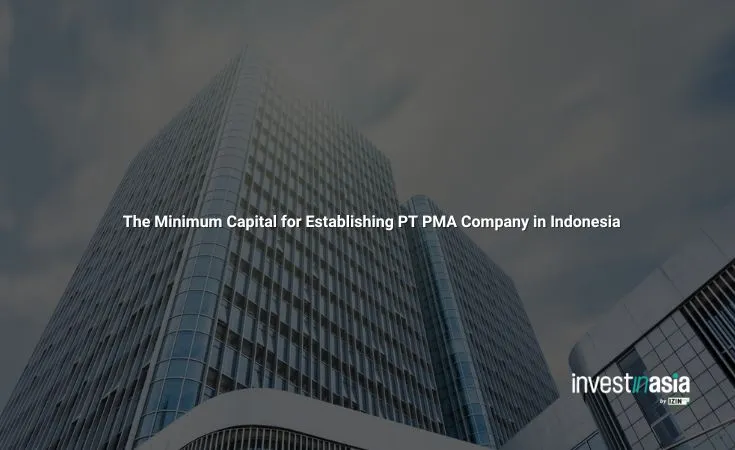The minimum paid-up capital for establishing a PT PMA (Penanaman Modal Asing) in Indonesia is now IDR 2.5 billion, including minimum total investment of IDR 10 billion per business sector, excluding land and buildings, as stipulated under BKPM Regulation No. 5 of 2025 issued by the Ministry of Investment / Indonesia Investment Coordinating Board (BKPM).
This new rule replaces the 2021 capital framework, enhancing investor accessibility while maintaining strict transparency and credibility in foreign direct investment (FDI).
The regulation also introduces a 12-month capital lock-up period to ensure that capital deposits represent genuine financial commitments.
These capital requirements ensure that foreign investors demonstrate financial capability and long-term commitment to Indonesia’s regulated markets.
Understanding these capital standards is crucial before registering through the OSS (Online Single Submission) system.
Also read: What is a PMA Company in Indonesia? Guide for Foreigner
PT PMA Minimum Capital Requirements under BKPM Regulation No. 5/2025


Foreign investors who wish to establish a PMA company in Indonesia need to be aware of the minimum capital requirements.
Minimum Paid-Up Capital
Under the 2025 regulation, the minimum issued and paid-up capital for a PT PMA has been reduced from IDR 10 billion to IDR 2.5 billion (approximately USD 150,000 based on the Bank Indonesia middle rate).
This amount must be fully deposited during company establishment to prove tangible shareholder commitment.
The paid-up capital is distinct from the minimum investment value, although it contributes toward fulfilling that requirement.
Also read: Advantages of Establishing a PMA Company in Indonesia
12-Month Capital Lock-Up Requirement
A key feature of BKPM Regulation No. 5/2025 is the 12-month capital lock-up rule, prohibiting withdrawal or transfer of the IDR 2.5 billion deposit for one year after payment — except for legitimate operational uses such as:
- Asset or equipment acquisition
- Property development or construction
- Working capital for daily operations
This provision ensures that capital contributions represent real investment, not temporary compliance deposits.
Minimum Investment Value Requirement
While the paid-up capital threshold has been reduced, the minimum total investment value remains IDR 10 billion per business line (5-digit KBLI code) and per project location, excluding land and buildings.
Investment value includes:
- Machinery and production equipment
- Vehicles and working capital
- Feasibility studies, licenses, and construction costs
The IDR 2.5 billion paid-up capital can count toward the IDR 10 billion total, leaving a remaining IDR 7.5 billion in qualifying assets or expenditures to meet full compliance.
Location Clarification
BKPM Regulation No. 5/2025 clarifies that “location” refers to administrative boundaries to avoid redundant capital calculations:
- For food and beverage businesses, one location covers a city or regency.
- For electric vehicle charging stations, one location applies to a province.
This clarification simplifies investment planning and compliance.
Also read: PT vs PMA vs KPPA Company Indonesia, What’s The Difference?
Consolidation of Related Business Activities
Foreign investors can now consolidate related activities within a single investment plan without recalculating the IDR 10 billion threshold for each KBLI code, provided they are operationally connected.
Examples include:
- A firm managing multiple wholesale and distribution lines
- A construction company handling materials and project management
- A food and beverage group operating both production and retail divisions
This reform enhances operational flexibility for diversified PT PMA structures.
Investor KITAS Capital Requirement
The corporate capital reduction does not affect the Investor KITAS requirement. Individuals applying for investor visas or residency must still demonstrate IDR 10 billion in capital ownership, as regulated by the Minister of Law and Human Rights Regulation No. 22 of 2023 (as amended).
Also read: How to Set Up PMA Company in Indonesia: Guide for Foreigner
Strategic Implications for Foreign Investors
The 2025 reforms lower entry barriers while strengthening governance. By reducing paid-up capital to IDR 2.5 billion and enforcing a lock-up period, Indonesia combines ease of entry with financial discipline.
Key benefits include:
- Easier market access for new investors
- Stronger investor confidence
- Improved capital transparency
- Support for long-term economic diversification
Partnering with InvestinAsia for PT PMA Registration
Establishing a compliant PT PMA requires careful structuring and documentation. InvestinAsia assists foreign investors in:
- Structuring capital in accordance with BKPM Regulation No. 5/2025
- Preparing OSS and BKPM filings
- Coordinating LKPM submissions
- Managing Investor KITAS and licensing
With expert guidance, investors can ensure efficient registration and full compliance with Indonesia’s evolving investment policies.
Contact us today for a consultation and take the first step towards your PT PMA Company registration in Indonesia.
Conclusion
BKPM Regulation No. 5 of 2025 marks a major milestone in Indonesia’s FDI framework. The reduction of minimum paid-up capital to IDR 2.5 billion, the 12-month lock-up requirement, and the retention of the IDR 10 billion total investment rule collectively signal Indonesia’s commitment to sustainable, credible, and investor-friendly growth.
Foreign investors should align their capital and compliance strategies accordingly to take full advantage of the updated PT PMA framework.




